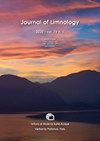Dataset of benthic copepods in the littoral zones of Lake Maggiore
IF 1.1
4区 环境科学与生态学
Q4 LIMNOLOGY
引用次数: 2
Abstract
Copepods (Crustacea: Copepoda) are widespread in aquatic ecosystems worldwide and represent an important component of the meiobenthic metazoan assemblages of lake littorals. Yet, little is currently known about the diversity of benthic copepods in lentic habitats. We gathered information on the benthic copepod assemblages of the littoral zone of Lake Maggiore as part of the Interreg Italy-Switzerland 2014-2020 Parchi Verbano Ticino project (ID: 481668), funded by the European Regional Development Fund (ERDF). Lake Maggiore is a large and deep temperate lake in north-western Italy human-managed from mid-March to mid-September. This contributes to substantial changes in water levels in relation to human activities such as hydropower, industrial and agricultural uses. We compiled a dataset listing 234 occurrences of benthic copepod species recorded from three littoral sampling sites situated in three protected areas, two of which are part of the Natura 2000 network in Italy and one is part of the Emerald Network in Switzerland. We collected the specimens during the summer-autumn period in 2019-2021. We identified the copepods at the species level and created a dataset with individual georeferenced occurrence records for each species, organized in a standardized Darwin Core Archive format. We made available, through the Global Biodiversity Information Facility (GBIF), a total of 13 distinct taxonomic entities and 234 unique georeferenced occurrence records related to the benthic copepod assemblages of the littoral zone of Lake Maggiore (Tabilio Di Camillo et al., 2023). The dataset has the potential to support the authorities in charge of managing Lake Maggiore’s water levels in addressing the ecological risk relevant to the littoral zone and in developing shared implementation strategies for sustainable water management.马焦雷湖沿岸海底桡足类数据集
桡足类(甲壳纲:桡足目)广泛分布于世界各地的水生生态系统中,是湖泊中小型底栖动物群落的重要组成部分。然而,目前对慢生物栖息地中底栖桡足类的多样性知之甚少。我们收集了马焦雷湖沿岸区底栖桡足类群落的信息,这是由欧洲区域发展基金(ERDF)资助的2014-2020年意大利-瑞士Parchi Verbano Ticino项目(ID:481668)的一部分。马焦雷湖是意大利西北部一个大型深温带湖泊,人类从三月中旬到九月中旬管理。这导致了与水力发电、工业和农业用途等人类活动相关的水位发生重大变化。我们汇编了一个数据集,列出了位于三个保护区的三个沿海采样点记录的234种底栖桡足类物种,其中两个是意大利Natura 2000网络的一部分,一个是瑞士Emerald网络的一个。我们在2019-2021年夏秋期间采集了这些标本。我们在物种层面上识别了桡足类,并创建了一个数据集,其中包含每个物种的单独地理参考发生记录,以标准化的达尔文核心档案格式组织。我们通过全球生物多样性信息基金(GBIF)提供了与马焦雷湖沿岸区底栖桡足类组合有关的总共13个不同的分类实体和234个独特的地理参考发生记录(Tabilio Di Camilo等人,2023)。该数据集有可能支持负责管理马焦雷湖水位的当局解决与沿海地区相关的生态风险,并制定可持续水管理的共同实施战略。
本文章由计算机程序翻译,如有差异,请以英文原文为准。
求助全文
约1分钟内获得全文
求助全文
来源期刊

Journal of Limnology
地学-湖沼学
CiteScore
2.70
自引率
6.20%
发文量
12
审稿时长
3 months
期刊介绍:
The Journal of Limnology publishes peer-reviewed original papers, review papers and notes about all aspects of limnology. The scope of the Journal of Limnology comprises the ecology, biology, microbiology, physics, and chemistry of freshwaters, including the impact of human activities, management and conservation. Coverage includes molecular-, organism-, community-, and ecosystem-level studies on both applied and theoretical issues. Proceedings of workshops, specialized symposia, conferences, may also be accepted for publication.
 求助内容:
求助内容: 应助结果提醒方式:
应助结果提醒方式:


